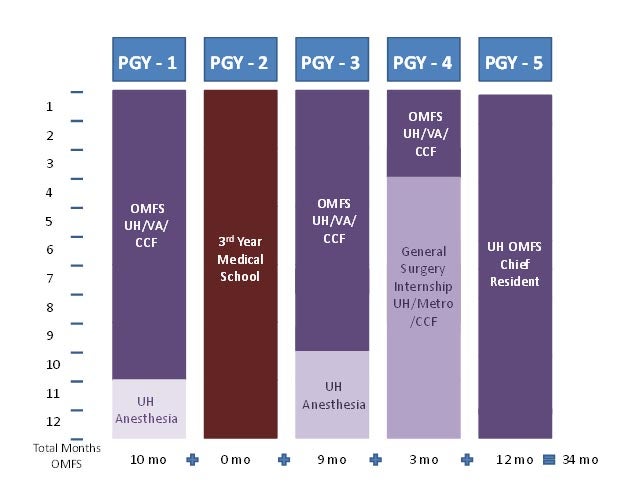5-year MD Track
Year 1: Intern (Average Stipend: $65,817; Average Tuition: $5,150)
All incoming interns begin on OMFS service, either at University Hospitals or Veteran’s Affairs, under the tutelage of an upper-year resident. During this time the interns have the opportunity to learn from other residents as knowledge and procedures are handed down from faculty. Interns are expected to take calls at UH and, where applicable, the Veteran's Administration (VA). While on the VA rotation, the intern is the primary OMFS resident and he/she receives a very rich experience in dentoalveolar procedures, including implant placement. These rotations will give the intern experience in diagnosis, information-gathering, dentoalveolar surgery, and major surgery within the scope of OMFS. While on the two-month anesthesia rotation, the resident will be paired with an anesthesiology resident or attending, learning and improving upon procedures involving management of the medically-compromised patient, airway management, pharmacologic management, intravenous sedation and general anesthesia.
Formal conferences are held to advance the residents in oral and maxillofacial pathology, contemporary issues in OMFS, orthognathics, implantology and anesthetic principles, case presentation, and OMFS knowledge updates. As well, interns are second year medical students and take part in a full-year course in physical diagnosis.
Year 2: Clerkships (Average Stipend: $0; Average Tuition: $55,370)
Residents will enter medical school as a third-year clerk and will, subsequently, rotate amongst the core clerkships, which include internal medicine, family medicine, obstetrics/gynecology, pediatrics, neurology, psychiatry and surgery. Residents have a two month elective rotation when they may decide to work in a different medical specialty or a different hospital/city. During this time residents are not expected to take call on the OMFS service nor are they expected to attend OMFS conferences. As such, no resident's stipend is allotted and residents are responsible for their medical school tuition and living expenses.
Year 3: Residency (Average Stipend: $71,070; Average Tuition: $55,370)
The third-year resident returns to the OMFS service and will spend a total of six months at UH as the junior resident assisting the chief resident in major surgeries as well as advancing his/her skill in principles of sedation and dentoalveolar surgery. Another rotation will be spent with MetroHealth.
Three further months are spent on the anesthesia service at UH, where the resident is given additional responsibilities running anesthesia in a room directly under the supervision of an attending. One of these three months is spent performing pediatric anesthesia.
The third year resident is responsible for studying and passing the Step II USMLE during this year. Upon completion of this year, the residents are awarded the MD degree from the Case Western Reserve University School of Medicine.
Year 4: Rotations (Average Stipend: $73,542; Average Tuition: $5,150)
Fourth-year residents are primarily off-service as general surgery interns. Residents rotate through plastic surgery, ENT surgery, general surgery, dermatological surgery, and trauma surgery at UH, VA and MetroHealth hospital. Through these rotations the residents earn 12 months GME credit towards their medical licensure.
Year 5: Chief (Average Stipend: $76,014; Average Tuition: $5,150)
During the senior year, the resident returns to the OMFS service as chief. The chief resident is responsible for the resident service, working-up surgical cases and is typically the first assistant in major surgical cases. During this time, the chief works closely with the AEGD residents to plan and perform surgery on simple and advanced implant cases. During this year the residents earn an additional 12 months ACGME credit, totaling 2 years by the end of the residency.
4-year MSD Track
48 month curriculum in Oral and Maxillofacial Surgery
|
|
|
|
|
|
|
|
|
|
|
|
|
|
|
|
|
|
|
|
|
|
|
|
|
|
|
|
|
|
|
|
|
|
|
|
|
|
|
|
|
|
|
|
|
|
|
|
|
|
|
|
|
|
|
|
|
|
|
|
|
|
|
|
|
|
|
|
|
|
|
|
|
|
|
|
|
|
|
|
|
|
|
|
TOTAL OMS: 6 months chief resident / 34 months OMS
ANESTH: 5 consecutive months (16 weeks adult anes / 4 weeks peds)
SURG/TRAUMA/SICU/ENT/PLAST: 6 months
INTERNAL MEDICINE: 3 months
ORAL AND MAXILLOFACIAL SURGERY PROGRAM PLAN COURSES FOR MSD
Course Num Course Name Credit Hours
DENT 501 core Biological Aspects of the Stomatological System 2
DENT 502 core Correlative Medical Science 2
DENT 513 core Anatomy of the Head & Neck 3
DENT 698 core Multidisciplinary Seminar 0
DENT 516 core Microbiol.Immunology & Imm.Sys 1
DENT 550 core Clinical Pharmacology 1
DENT 510 core Epidemiology & Biostatistics 3
DENT 514 Research Methods: Preparation 1
DENT 518 core Behav Consid Oral Health Care 1
DENT 555 core Management Medical Emergencies 1
DENT 512 core Advanced Oral Pathology 3
DENT 509 TMD , OFP and Sleep disorders 1
DENT 507 core Dental Ethics 1
DENT 651 core Thesis M.S.D. 9
OMS COURSES
DENT 580 OMS Orthodontic Orthognathic Seminar 6
NEW OMS OMFS Pathology Seminar 6
NEW OMS OMFS Parameters of Care: Lit Review 12 given 10 months (20 hours)
NEW OMS Surgical Case Presentation Conference 12 given bi monthly 12 months)
NEW OMS Basics OMS conference 12 given weekly 11 months)
NEW OMS Advance OMS clinical training 6 clinical dental training


